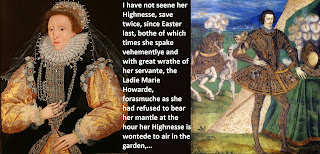Queen Elizabeth may not have liked her ladies-in-waiting to flirt with courtiers but surely showing attraction to her favorite the Earl of Essex turned the chastity of an old maid into out-right jealousy. That chastity, after all, was not purely voluntary. It was not for nothing that her favorites were always young and physically attractive and enjoyed sometimes shocking liberty of behavior including long unchaperoned hours in her chambers. But it is unlikely that she could have been so strong a queen if she had married.
Did Mary Howard begin to shirk her duties in order to
moon over the handsome Earl? While not impossible, it seems far more likely
that the Queen’s jealousy made Mary’s every act into a dereliction equal to an
actual offense of which she could not be accused outright.
Here the courtier William Fenton writes to Queen Elizabeth’s godson, sometimes also a favorite afforded special privileges, praying him to quietly contact the Queen’s closest counselors in an attempt to save Howard from the Queen’s wrath. He is careful to praise the Queen highly and only to imply the nature of the situation in case his letter might be discovered.
Mr. Fenton to John Harington, Esq. at Bathe. 1597.
It seemethe marvellous that our gracious Queene hathe so muche annoyance from her most bounden servaunts; I verily think her Highnesse cannot demande what is not due from any of her subjects. Her owne love hathe so wrote [wrought] on us all, that the hearte muste be evil that dothe pay her its small dutie so grudgingly as some have done of late. I have not seene her Highnesse, save twice, since Easter last, bothe of which times she spake vehementlye and with great wrathe of her servante, the Ladie Marie Howarde, forasmuche as she had refused to bear her mantle at the hour her Highnesse is wontede [in the habit] to air in the garden, and on small rebuke did vent suche unseemlie answer as did breede much choler in her mistresse. Again, on other occasion, she was not ready to carry the cup of grace during the dinner in the privie-chamber, nor was she attending at the hour of her Majesties going to prayer. All whiche dothe now so disquiet her Highnesse, that she swore she would no more shew her any countenance, but out with all such ungracious flouting wenches; because, forsoothe, she hathe much favour and marks of love from the younge earl, which is not so pleasing to the Queene, who dothe still muche exhort all her women to remaine in virgin state as muche as may be. I adventured to say, as far as discretion did go, in defence of our friende; and did urge muche in behalfe of youthe and enticinge love, which did often abate of righte measures in faire ladies; and moreover related whatever might appease the Queene, touchinge the confession of her great kindness to her sister Jane before her marriage; all which did nothinge soothe her
Highnesse anger, saying, "I have made her my servante, and she will
now make herself my mistresse; but in good faith, William, she shall not, and
so tell her." In short, pitie doth move me to save this ladie, and woud
beg such suit to the Queene from you and your friendes, as may winn her favour
to spare her on future amendmente. If you coud speak to Mr. Bellot to urge the
Lord Treasurer on this matter, it might be to goode purpose, when a better time
dothe offer to move the Queene than I had; for wordes then were to no availe,
tho as discreetlie brought as I was able. It might not be amisse to talke to
this poor younge ladie to be more dutiful, and not absent at meals or prayers;
to bear her Highnesse mantle and other furniture, even more than all the reste
of the servantes ; to make ample amends by future diligence; and always to go
first in the morning to her Highnesse chamber, forasmuche as suche kindnesse
will muche prevail to turne awaie all former displeasure. She must not
entertaine my lorde the earle, in any conversation, but shunne his companye;
and moreover be less carefull in attiringe her own person, for this seemethe as
done more to win the earl, than her mistresse good will.
Suche, and other advice, as you and other friendes are more able to give on these matters, may prevent all other extreme proceedinge, especiallye if it be urged by my Lorde Treasurer, in assurance of her good behaviour. If we consider the favours shewed her familie, there is ground for ill humour in the Queen, who dothe not now beare with such composed spirit as she was wont; but, since the Irish affairs, seemethe more froward than commonlie she used to bear herself toward her women, nor dothe she holde them in discourse with such familiar matter, but often chides for small neglects; in such wise, as to make these fair maids often cry and bewail in piteous sort, as I am tolde by my sister Elizabeth.
Pray observe secresy in discovering my good will, when you
speake to Mr. Bellot, or write to the Lorde Treasurer; as it is not safe to bee
too meddling in such matters. Commende me to your Ladye Mall, not forgetting
her brothers and childerne. And now in all love I hie to mine office and dutie,
remaining
Your Servante,
May 23, 1597. W. Fenton
Source: Park, Thomas. Nugae Antiqutae: Being a Miscellaneous Collection of Original Papers,... (1804). I.232-235.






No comments:
Post a Comment